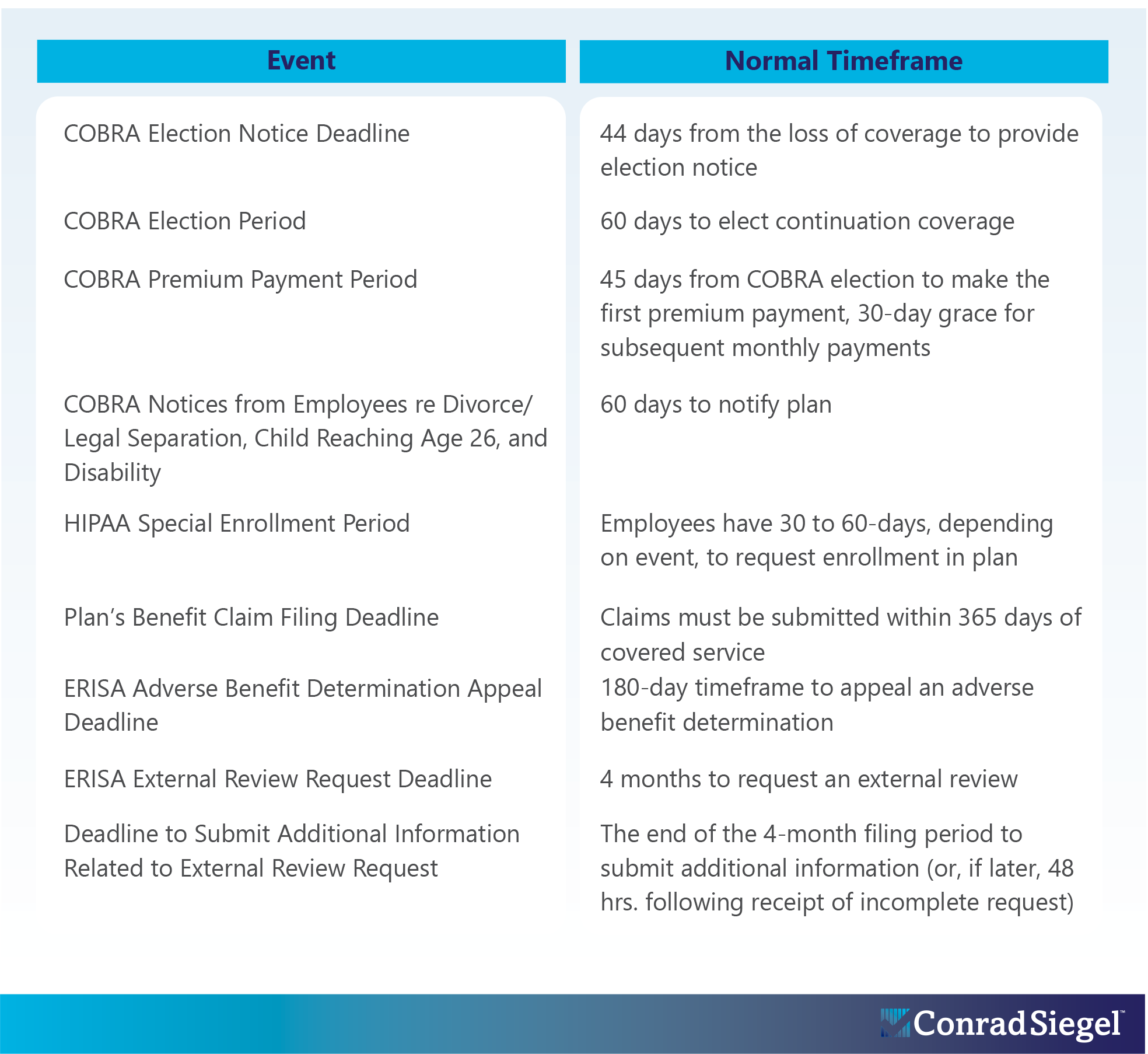Group Health Plans | Adjustments to Requirements and Deadlines

On April 28, 2020, The Department of Labor’s (DOL) Employee Benefit Security Administration (EBSA) issued EBSA Disaster Relief Notice 2020-01 to provide relief for various requirements and deadlines under the Employee Retirement Income Security Act (ERISA).
For group health plans, subject to ERISA or the Internal Revenue Code, the relief provides additional time to comply with certain deadlines affecting COBRA continuation coverage, special enrollment periods, claims for benefits, appeals of denied claims, and external review of certain claims. With regard to disability, retirement, and other plans, the joint notice provides additional time for participants and beneficiaries to make claims for benefits and appeal denied claims.
Under the extension, the regular deadlines for the items listed below are essentially paused until the COVID-19 national emergency is declared over.

The extensions are retroactive to March 1, 2020, the declared beginning date of the COVID-19 national emergency. President Donald Trump has not yet declared an end date for the COVID-19 national emergency. Sixty days after the COVID-19 national emergency is declared over, the above-noted extensions will be discontinued. This period is referred to in the rules as the “Outbreak Period.”
Listed below are a few examples that may help put the above deadline extensions in perspective. For purposes of these examples, let’s say the national emergency will expire on July 25, 2020.
Example 1
COBRA Election Period – Under COBRA, employees and dependents who lose active coverage as a result of a qualifying event have 60 days from the date they receive the COBRA election notice to elect continuation coverage.
Employee’s hours are reduced causing the employee to lose active coverage under the health plan, which is a COBRA qualifying event.
The employee receives the COBRA election notice on April 1, 2020.
– Prior to the extension, the employee would have 60 days or until May 31, 2020, to elect COBRA.
– With the extension, and assuming the national emergency will expire on July 25, 2020, the employee would have until November 22, 2020, to elect COBRA.
- Assuming the national emergency ends on July 25, 2020, and therefore the Outbreak Period ends September 23, 2020.
- Employee would have 60 days from September 23, 2020, to elect COBRA: November 22, 2020.
Example 2
COBRA Premium Payment Period – Under COBRA, qualified beneficiaries have 45 days from the COBRA election to make their first premium payment, and subsequent monthly payments must be made by the end of the 30-day grace period that starts at the beginning of each coverage month.
The employee is a COBRA qualifying beneficiary who fails to make timely COBRA premium payments by the end of the 30-day grace period for March 2020 and April 2020.
– Prior to the extension, the employee would have a 30-day grace period or until March 31, 2020, to pay March 2020 premium. If no payment was made, the employee’s coverage would be terminated.
– With the extension, and assuming the national emergency will expire on July 25, 2020, the employee would have until October 23, 2020, to pay March 2020 and April 2020 plus any additional premium months incurred.
- Assuming the national emergency ends on July 25, 2020, and therefore the Outbreak Period ends September 23, 2020.
- Employee would have 30 days from September 23, 2020, to submit all COBRA premiums due: October 23, 2020.
Example 3
HIPAA Special Enrollment Period – Under HIPAA, employees have a 30-day special enrollment period to request enrollment in the health plan in the event that they lose coverage or acquire a dependent by birth, marriage, adoption, or placement for adoption. In addition, employees have a 60-day enrollment period to request enrollment in the health plan if they or their dependent loses Medicaid/CHIP eligibility or become eligible for Medicaid/CHIP.
Employee previously waives coverage and on March 1, 2020 gives birth to a child. She would like to enroll herself and her newborn as of March 1, 2020.
– Prior to the extension, the employee would have a 30-day or until March 31, 2020, special enrollment period.
– With the extension, and assuming the national emergency will expire on July 25, 2020, the employee would have until October 23, 2020, special enrollment period.
- Assuming the national emergency ends on July 25, 2020, and therefore the Outbreak Period ends September 23, 2020.
- Employee would have 30 days from September 23, 2020, to enroll herself and her child in the plan: October 23, 2020.
For additional information about the rules and notice:
https://www.federalregister.gov/documents/2020/05/04/2020-09399/extension-of-certain-timeframes-for-employee-benefit-plans-participants-and-beneficiaries-affected
[vertical-spacer]
Have questions on what this means for you or your organization?
We’re here for you!
[wpforms id=”6075″ title=”false” description=”false”]
Our health and welfare compliance updates are designed to provide useful information to organizations about the operation and management of their employee benefit plans. Although we go to great lengths to ensure that only accurate and timely information is provided, we recommend that you consult with an attorney for professional assurance that our information, and your interpretation of it, is appropriate for your particular situation. Nothing provided herein should be construed as legal or tax advice.
